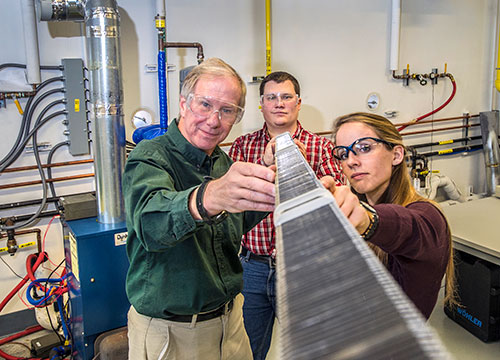- Home
-
Divisions
Energy Systems Division
- Grid Modernization and Security
- Energy Conversion
- Geothermal Materials
Energy Storage Division
- In-situ and Operando Analysis
- Vehicle Technologies
- Grid-level Storage
- Center for Mesoscale Transport Properties
- Long Island Solar Farm
- NSERC
- People
- Org Chart
Energy Systems Division
Building Technologies
Cold Climate Air-Source Heat Pumps

Tom Butcher and Rebecca Trojanowski innovating retrofit solutions for enhanced heat transfer in baseboard radiators, promoting cost-effective and efficient heating systems within existing infrastructure in partnership with Stony Brook University's Mechanical Engineering Department.
Brookhaven Lab carried out in-field performance testing of a range of air-source heat pump technologies that represent innovative systems relevant to cold climates. In coordination with the National Renewable Energy Laboratory (NREL) and collaboration with Center for Energy and Environment, Energy Futures Group, Frontier Energy, Taitem Engineering, and The Levy Partnership, over a year’s worth of data across 20 sites in cold climates were captured to map the performance of heat pumps. These results will inform the research and development of energy-efficient equipment and help develop guidelines for optimizing primary energy savings when using air-source heat pumps in heating-dominated regions. This data will enable the accelerated adoption of air-source heat pumps by designers, installers, state and regional energy efficiency organizations, and building owners.
Best Practices for Residential Heat Pumps
Residential and commercial heat pumps have known research gaps and Brookhaven lab is working with Pacific Northwestern National Laboratory (PNNL) and NREL to develop in-field tests to address these gaps. Brookhaven has worked with manufacturers and trade organizations to develop training materials for installation, maintenance, and clarity of best practices for heat pump installation across the United States.
Enhanced Thermal Distribution Systems
Applying a forced-flow air supply for common baseboard radiators can provide consumers with a low-cost option for adapting high-efficiency heating. Brookhaven Lab, Stony Brook University, and Slant Fin performed feasibility tests using high-efficiency, low-temperature heat sources (i.e., heat pumps, condensing boilers, and solar collectors) to increase the effectiveness and output of baseboard heating sources. Brookhaven is now working with Mestek Inc. to further develop the concept into a consumer product.
Corrosion Resistant Heat Exchangers
In collaboration with Fulton Boiler Company, Brookhaven Lab developed a low-cost corrosion-resistant heat exchanger for high-efficiency steam boilers, which increases the efficiency of steam systems and lowers costs.
Improving Efficiency of Air-cooled Condensers
Brookhaven together with United Technologies Research Center (UTRC), Texas A&M, and Gas Technology Institute (GTI) supported Stony Brook University in the improving cooling performance of air-cooled condensers by using evaporative cooling measures
Distributed Energy Generation / Micro–Combined Heat and Power
Brookhaven has installation and testing capabilities for operating solid oxide fuel cells that are integrated into a building’s energy load or in an island standalone mode. (Partners: Aris Renewable Energy, National Grid)
High-Efficiency Burner Design
Brookhaven, in collaboration with Alabama A&M University, conducted research on spray patterns and particle size distributions in order to design a residential oil burner with low firing rates and load modulation capabilities to enhance efficiency measures and achieve stable combustion in residential oil burners.




